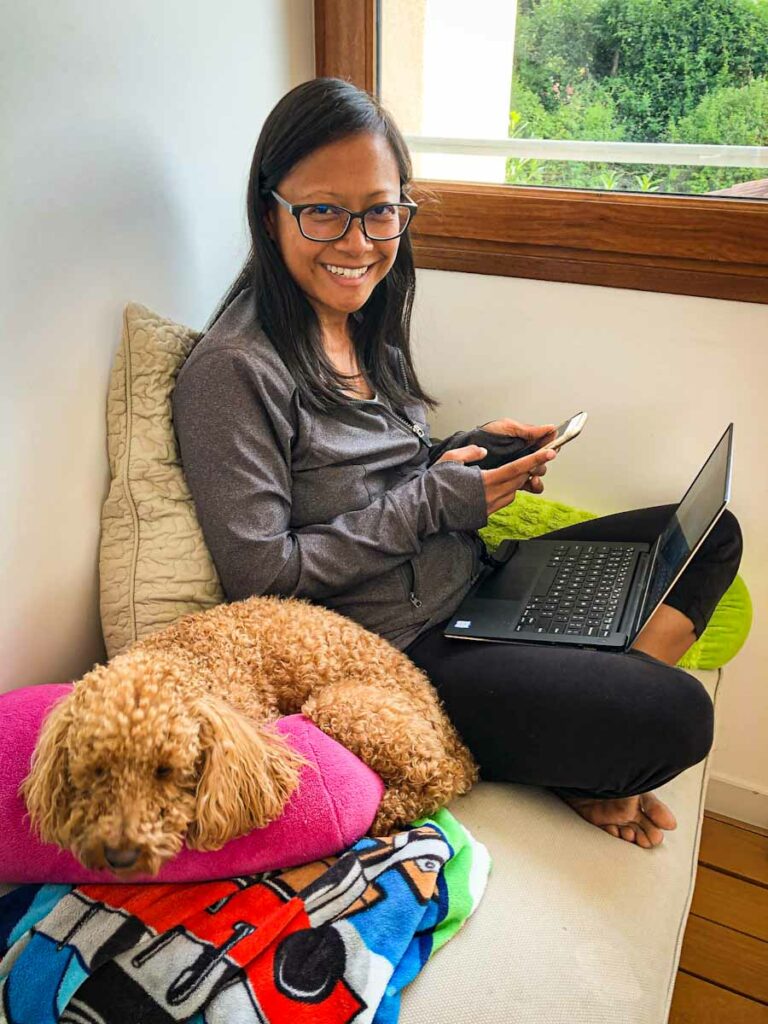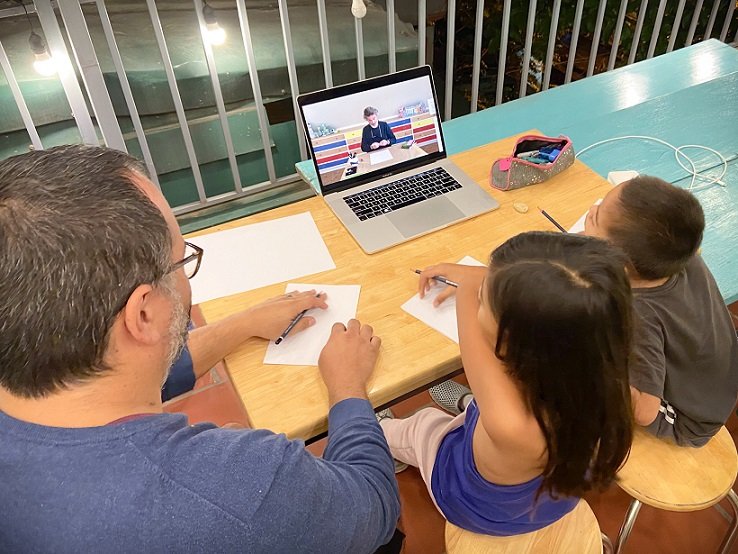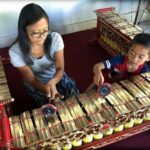Episode 10: Can I Work While Worldschooling?

In this episode of Worldschooling Q&A, Astrid and Clint dive into a commonly asked worldschooling question: can I work remotely or take on temporary jobs while traveling?
Worldschooling Q&A – Episode 10
Hosts: Astrid & Clint, creators of The Wandering Daughter
Title: Episode 10: Can I Work While Worldschooling?
Episode Summary
In this episode of Worldschooling Q&A, Astrid and Clint tackle one of the most common questions families ask when planning long-term travel: “Can I work while worldschooling? Is it possible to work remotely or take on temporary jobs while traveling to support worldschooling?”
Drawing from their own four years of full-time travel, they explore the realities of funding a worldschooling lifestyle through remote work, freelance projects, and small businesses — all while maintaining legal and ethical integrity abroad.
They discuss the difference between working for a U.S.-based employer versus running your own business, share tips for navigating visa regulations, and offer cautionary advice about staying compliant and respectful of local economies. Astrid and Clint also highlight the growing availability of digital nomad visas and ethical guidelines for those balancing family life, travel, and work.
Whether you’re considering becoming a digital nomad or simply want to fund your family’s global education responsibly, this episode is a practical guide for balancing income and adventure.
Understanding your options for earning income on the road
Families often ask whether they can work while worldschooling, and the honest answer is that there are several workable paths. The key is choosing approaches that fit your family’s values, your skills, and the practical realities of traveling with kids.
Remote jobs you can take anywhere
For many families, the easiest way to work while worldschooling is to keep a remote role with a company based in their home country. In the podcast episode, we talk about how asking an employer for remote flexibility can sometimes be more possible than parents expect. Some companies even support the idea of working from anywhere for a set period of time.
When families use remote work as their main way to work while worldschooling, it can create a sense of stability. That's because you already understand your role, the expectations, and the income you can rely on each month.
Self-employment and freelancing
Another common path is freelancing or running a small business. Many families who work while worldschooling do things like web development, writing, tutoring, or consulting. Some run e-commerce shops or online platforms that can be managed from anywhere.
In our own travels, we balanced remote employment with freelance work and our online businesses. Families who choose this route often appreciate the flexibility. But they do need to think through business registration and taxes, since where your business is based affects what you owe.
Temporary or contract work
Some parents choose temporary or short term roles that allow them to work while worldschooling, such as online tutoring or short freelance contracts. These roles can give you more control over your hours, especially when you want to protect learning time with your kids.
It is important to make sure these opportunities do not place you in conflict with local labor rules. Families who plan carefully can use these flexible jobs to build a sustainable rhythm for travel and learning.
Navigating visas, rules, and responsibility
Before choosing how you will work while worldschooling, it helps to understand the responsibilities that come with earning income abroad. Every country has its own rules, and our episode highlights how important it is to approach these choices with care.

Understanding tourist visas
Most families who work while worldschooling use tourist visas. These visas often allow you to earn income from your home country as long as you are not earning from local clients or taking local jobs.
Some tourist visas include ambiguous language, which means families need to decide their own comfort level with that uncertainty. In our experience, we stayed under six months in each country and kept all income tied to US based clients. This helped us maintain clarity and reduce risk while continuing to work while worldschooling.
Digital nomad visas and long term options
More countries are creating digital nomad visas designed for remote workers who earn income from abroad. These can be helpful for families who want to work while worldschooling for longer periods of time in one destination. The expectation is that your income comes from outside the country and that you spend that income locally in a way that supports the local economy.
Some families appreciate the structure these visas offer. Others prefer tourist visas because they involve fewer requirements. Whichever route you choose, the goal is to work while worldschooling in a way that keeps both your family and the communities you visit protected.
Ethical considerations
A big part of family travel is being mindful of the impact we have as guests. When you work while worldschooling, it is important to avoid taking roles that belong to local workers or starting a business that serves local customers without proper permission.
Even volunteer work can cause harm if it displaces local opportunities. Choosing roles that bring outside income into a destination supports both your travels and the local community. This is an essential piece of being responsible while you work while worldschooling.
Creating a sustainable work and learning rhythm
Once families understand their options and responsibilities, the next step is finding a rhythm that supports both travel and learning. The transcript offers helpful insights about the balance required to work while worldschooling as a family.

Balancing work hours and learning time
Parents who work while worldschooling often create intentional routines around their work blocks and their kids’ learning time. This might include early morning work hours, shared quiet time, or choosing destinations with strong coworking spaces and libraries.
The balance looks different for every family. What matters is protecting space for meaningful learning, connection, and downtime. When families create this structure together, work while worldschooling feels much more manageable.
Adapting to changing needs
Travel brings unpredictability, and families who work while worldschooling learn to adapt. WiFi may be inconsistent. Kids may need more support during weeks when transitions feel overwhelming. These moments are part of the journey, not a sign that you are doing anything wrong.
Building flexibility into your expectations can make the experience more rewarding for everyone. Many families find that the adaptability they develop when they have to work while worldschooling becomes a core life skill their kids carry forward.
Leaning on community
Community support makes a big difference. Online groups, worldschooling meetups, and family travel hubs can all provide tips and reassurance.
When parents choose to work while worldschooling, hearing how others make it work can ease doubts. It can also spark new ideas about income streams or ways to structure learning. Community helps families stay grounded, especially during long term travel.
Submit your worldschooling questions here!
Episode guide
Why families consider working while traveling
- Need for sustainable ways to fund worldschooling.
- Some families travel using savings or selling assets, but this is less common.
Types of income sources while traveling
- Remote employment with a home-country company.
- Freelance or contract work.
- Running online businesses (e-commerce, websites).
- Tutoring or teaching online.
Visa considerations and legal gray areas
- Rules differ by country and visa type.
- Some tourist visas prohibit earning local income.
- Ambiguity is common, and families must assess risk tolerance.
- Staying under six months helps avoid tax complications.
Responsible and ethical work practices
- Avoid taking work that impacts local employment.
- Do not run businesses that serve local clientele without proper visas.
- Digital nomad visas exist to encourage bringing outside income into the economy.
Employee vs. self-employed considerations
- Transparency with employers is essential.
- Some companies restrict remote work due to tax implications.
- Self-employed families must consider where their business is registered.
Practical tips and resources
- Use platforms like FlexJobs to find remote-first roles.
- Community resources like Trailblazing Families offer job ideas.
- Some companies explicitly support work-from-anywhere arrangements.

Chapters
00:00:00 – Introduction
00:01:19 – Today’s Question: Can I work remotely or take on temporary jobs while traveling?
00:02:27 – Why sustainable income is key for worldschooling families
00:04:00 – Understanding visas and local regulations
00:06:32 – Digital nomad visas and legal gray areas
00:09:14 – Staying ethical and respecting local economies
00:11:04 – Working as an employee vs. being self-employed
00:14:17 – Finding remote and temporary job opportunities
00:16:41 – Avoiding impact on local communities
00:18:27 – Final thoughts and how to connect with Astrid & Clint
Further worldschooling resources
- What Life Is Like For A Digital Nomad With Family
- International WiFi Options for Working Nomads and Travelers
- Best Travel WiFi Router (And 7 Tips for How To Use A Portable Router)
Support the podcast
- Join The Wandering Daughter on Patreon for episode transcripts, extra resources, and live office hours with Astrid and Clint.
- Follow and subscribe on Spotify, Apple Podcasts, and YouTube.
- Leave a five-star review to help others discover the podcast.
- Submit your worldschooling questions to our podcast page.





